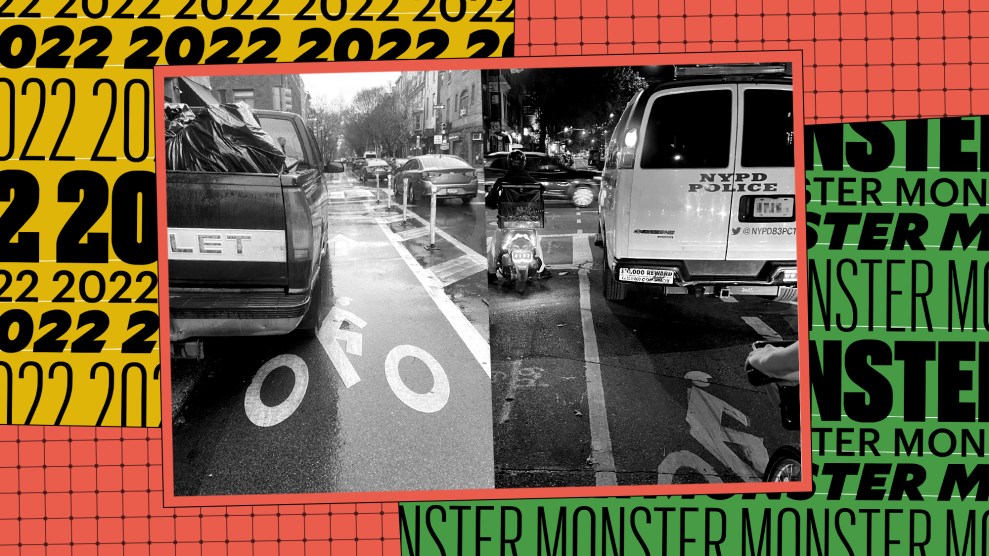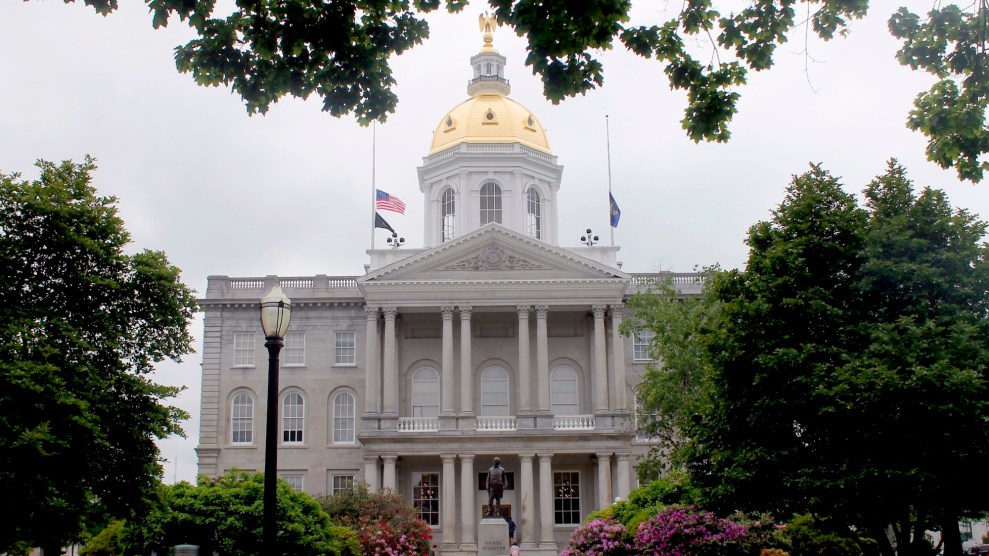
Mother Jones; Courtesy of Grace Molteni; Courtesy of Jacob Rosenberg
The last time I got in a fight was about four years ago in San Francisco. The incident involved me, my bike, and a car. And when I say fight, I mean a stranger shoved me to the ground and I ran away—the bike under me as I hurried like a child riding a stick that’s supposed to be a make-believe horse.
It was a moment of mutual road rage. I was headed home from work on a one-way street, plodding along in the bike lane on the right side. As I approached a side street, a car cut in front of me—ostensibly to make a right turn. Annoying, but acceptable. I tried to slow down. The car, however, did not turn; it parked. In the bike lane. I hit the Toyota and flipped over my handlebars. And, in sort of a beautiful bit of timing, as I was about to make my landing, the car moved forward just a bit. At this point, my shoulder, and general head area hit the pavement. Bam, bam. (I was fine.)
Propelled by a dose of adrenaline and an overwrought sense of justice, I hobbled over to the car’s window. Before I could even begin to berate anyone, someone yelled: “Keep it fucking moving.” Out of the passenger seat, a man emerged (let’s pretend he was big but I don’t remember). He walked over to me and pushed me to the cement. “Uh, what the fuck?” I asked from the less-than-dominant position of the ground. And then I got up and did what I was told: I kept it fucking moving.
For me, this was all fine if frustrating. Getting pushed? Okay, I’ve been to middle school, we can deal with it. Crashing on my bike? It happens. But the particular indignity of the next part was what has stuck with me.
After my time on the cement, I started riding home. And even then I still had to dodge many cars parked in the bike lane. It was like having to clean up the mess your bully made after giving you a swirlie. Navigating the often-obstructed bike lane, swerving into the street where car traffic sped along, I had to look behind me into oncoming traffic. (I’ve been told that making eye contact with drivers forces them to acknowledge you’re a real human being and therefore they will be less likely to hit you.)
The entire time I kept thinking: What if one of these cars smushes me? And what if after it happens, the driver doesn’t even think it’s their fault? Dying is part of life. But to die at another’s hands (as they grip the wheel) without the perpetrator feeling any twinge of guilt? That is not a just world in which I want to live. Often when I am almost run down by a car while biking, the thing I realize is: That driver thinks I’m being annoying and I think they’re being evil. The yawning gap in emotion bugs me.
That disconnect has been on my mind a lot this year after I moved back to New York City.
Many of my happiest memories here are attached to biking. When I had little money, as a freelancer after college, my best friend and I had a cherished weekend tradition. I would steal a roommate’s bike, and we would head down from Bushwick to Sunset Park. There, we ate tacos, and then rode to a cafe in Red Hook, sitting near the water, reading books—pausing now and then to talk. It was a cheap and fun way to spend a day.
We used some bike lanes. But the thrill was in part listening to loud music in our headphones, dodging cars, and dipping in and out of traffic. It felt like a low-level rebellion. Biking did not feel normal. It was not carefree. At the time, I didn’t mind a car parked in a bike lane—all the better reason to get into the street, try to skim past a vehicle stuck in traffic, yell at someone over an Arthur Russell song that seemingly everyone was listening to.
That doesn’t seem as appealing now. (Even if I do sometimes indulge.) Now, in a landscape with bike lanes, I am flummoxed by how dangerous it feels to use what seems to be the easiest, best form of transportation to get around town. This year, as Gothamist reported, traffic deaths have gone down slightly but the problem is still massive: In 2022, guns were involved in 246 deaths in New York City; there were 247 traffic deaths. (Despite that, the crime narrative that fueled the governor’s race did not exactly hone in on the automobile.)
For a week, I kept track of how often I had to go into the street because a car was parked in a bike lane. It was astounding. On average I saw one car parked in a bike lane for every 2.5 minutes of biking.
For a week, I kept an extremely rough approximation of the number of cars parked in the bike lane per ride. 1 car for every 2.5~ minutes https://t.co/tjciY1jkUN pic.twitter.com/qKhKH1AGkQ
— Jacob Rosenberg (@jrrosenb) November 14, 2022
For Mother Jones, Abigail Weinberg has written “accidents” don’t exist; they are really safety design flaws. Last year, my colleague Tim Murphy chose cars generally as a monster of 2021, noting that there are few consequences for hitting someone with an automobile. What increasingly irks me about cars is their sheer presumption. To think about designing a city around biking, or walking first is considered to not be serious about the world. It is considered the pipe dream of activists. And that arrogant car chauvinism, for me, is most noticeable when I see a vehicle parked in a bike lane. It is as if a driver has said: I will take that too.
I often wonder if I will be able to bike in New York City when I am sixty. When will be the last time my friend and I can have that day from Sunset Park to Red Hook?
When I see a car in a bike lane, it is not only an annoyance but a reminder that creating a livable city—with the fullest meaning of that phrase—will take more than some paint on the ground. I can’t imagine doing something this casually dangerous for the rest of my life. I can’t imagine not doing it either.
As usual, the staff of Mother Jones is rounding up the heroes and monsters of the past year. Find all of 2o22’s here.














